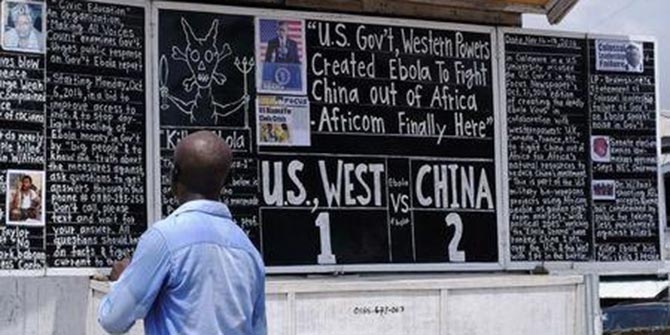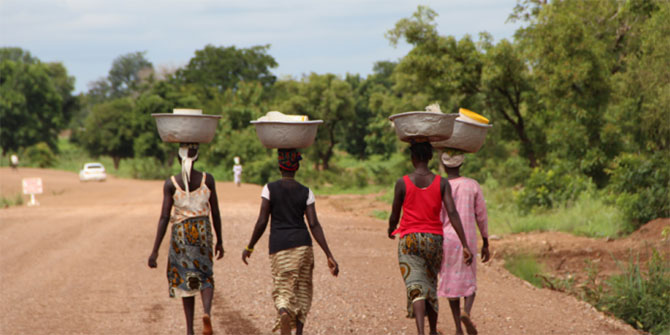LSE’s Mitchell Aghatise asks whether the undoing of Ebola can be that on which the disease also thrives: human kindness.
A few months ago, the job of Liberia’s Minister of Commerce and Industry Axel Addy revolved around ensuring a stable business climate within Liberia. In a recent press conference at IGC’s Growth Week 2014 at LSE, he relates that in Lofa district, a few months back, he was talking to cotton farmers about value added to the mere business of farming – this was at a time when his most pressing problems were fluctuations in the prices of cotton and rubber, two of Liberia’s prime exports. There is little doubt that given the destruction Ebola has inflicted on the country, concerns about fluctuating international prices seem luxurious in the current climate.

Ebola has crippled Liberia. Watching the devastating effects on various news outlets often paints it as otherworldly – oftentimes by no fault of theirs – reducing real families and stories to mere statistics. Mr Addy’s presentation showed that there is life behind the Ebola-imposed curtains, and a government fighting against the odds to battle this unfamiliar beast. He spoke of supermarkets with expiring stocks as the expatriate market for those goods have all but disappeared.
As swathes of the country face quarantine, the social construct of society has broken down. As people avoid as much social contact as is possible, industries have disappeared with markets either drying up or a lack of staff willing to venture out and supply goods because of the fear of being infected. The thriving pre-Ebola beer industry has all but packed up. This is no surprise given that bars and other public places have been shut down in a bid to contain the spread of the disease. The economy has, in effect, ground to a standstill.
More and more money is rightly being used to fight the epidemic; the opportunity cost is that other activities are on hold. Although the health sector is absorbing the majority of funds available, the existing poor infrastructure means that the intense focus on Ebola is resulting in the neglect of other ailments which, in turn, leads to preventable deaths.
Mr Addy emphasised in his speech that Ebola is a disease that spreads by virtue of human kindness. It thrives on the kindness of a mother who will rather wash up the wounds of her dying child, the kindness of a community who will rather hide to bury their loved ones in a dignified manner, the kindness of the stranger who notices an ailing boy, carries him on his bicycle to the nearest hospital. The prevailing message though is that, human kindness too can defeat Ebola. The minister’s considered message for the international community was that help is needed, as he responded to a question from a media correspondent, “…the time-frame for that help is yesterday…” International organisations have worked tirelessly to help and for this Liberia are grateful but the effort is not moving as fast as the disease. These are not mere statistics. Siblings are being bereaved, children are becoming orphans and spouses are being widowed. Human kindness from the international community is a must to ensure that this trend does not continue unabated. Mr Addy also noted that the African Union has sent doctors and financial help to help combat this disease – camaraderie which this writer salutes.
Ebola can and will be defeated – a silver lining from the minister’s speech was that more and more people are leaving isolation centres cured of their ailments. However, this also presents new challenges as they are often discriminated against when they move back to their host communities. The government is working to sensitise and educate people, but resources are thin, manpower is few and in some communities, the reception is hostile. The horizontal goal is to defeat Ebola and contain this raging epidemic but beyond that, there are lessons that have been and will be learned.
He alluded to the weak health system prior to Ebola as the reason why this disease has spread so quickly. It is a shocking and brutal way to realise the importance of investment in healthcare. The economic impact and crippling effect will be felt for some time. The constant intervention by the Central Bank to stabilise inflation rates cannot continue indefinitely; the significant reduction in growth projections will hurt the economy and the mass exodus of expatriate staff and the pause in a number of industries does not provide the certainty needed for business to thrive. However, beneath the words and the statistics, there is a country who wants to be out of the eye of the Ebola storm and in the way of recovery. It is one thing to discuss recovery, but this will not happen while the country is bound in the shackles of this disease. With international help, this terrible disease can become a thing of the past and the country can then begin to talk of ascending the economic ladder once more. Another beast has beset Liberia, but unlike the civil war, this thrives on kindness. But if the international community wades in, maybe the kindness it thrives on will be its undoing.
Mitchell Aghatise is a masters student at LSE and co-director of the Business Conference of the 2015 LSE Africa Summit.






Enlightening, scholarly and persuasive. Good job, Mitchell!
Awesome piece. Really scary to see how such a disease that thrives on human kindness has crippled an economy. Our prayers and thoughts are with the people of Liberia